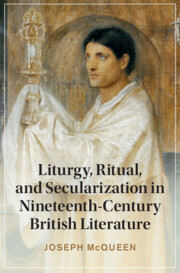Book contents
- Liturgy, Ritual, and Secularization in Nineteenth-Century British Literature
- Cambridge Studies in Nineteenth-Century Literature and Culture
- Liturgy, Ritual, and Secularization in Nineteenth-Century British Literature
- Copyright page
- Dedication
- Contents
- Figures
- Acknowledgments
- Introduction
- Chapter 1 Mediating the Modern
- Chapter 2 Memory and Revolution
- Chapter 3 Tractarian Liturgies
- Chapter 4 Realist Liturgies
- Chapter 5 Liturgical Aestheticism
- Chapter 6 Against Immanence
- Epilogue
- Notes
- Bibliography
- Index
- Cambridge Studies in Nineteenth-Century Literature and Culture
Chapter 5 - Liturgical Aestheticism
Walter Pater’s Sacralization of the Body
Published online by Cambridge University Press: 14 November 2024
- Liturgy, Ritual, and Secularization in Nineteenth-Century British Literature
- Cambridge Studies in Nineteenth-Century Literature and Culture
- Liturgy, Ritual, and Secularization in Nineteenth-Century British Literature
- Copyright page
- Dedication
- Contents
- Figures
- Acknowledgments
- Introduction
- Chapter 1 Mediating the Modern
- Chapter 2 Memory and Revolution
- Chapter 3 Tractarian Liturgies
- Chapter 4 Realist Liturgies
- Chapter 5 Liturgical Aestheticism
- Chapter 6 Against Immanence
- Epilogue
- Notes
- Bibliography
- Index
- Cambridge Studies in Nineteenth-Century Literature and Culture
Summary
The fin-de-siècle aesthetes, of course, react against the moral project expressed in realist novels like Eliot’s and Ward’s. Indeed, Oscar Wilde uses liturgy to attack what he sees as realism’s stunted imagination. But, as this chapter and the next show, aestheticism too is deeply suspicious of how excarnation separates the material and the spiritual. Again, if modernity typically sunders these realms, liturgy joins them. It therefore offers the perfect channel for aestheticism’s veneration of material reality – of beautiful bodies, lovely objects, and stimulating experiences. Such devotion pervades Walter Pater’s novel Marius the Epicurean (1885) – itself a kind of liturgical and aesthetic bildungsroman. Set in second-century Italy, the novel follows the pious Marius, who cherishes the pagan rituals of his boyhood and finds their fulfillment in the early Christian Mass. For Marius, the Eucharist not only sacralizes material objects but also defends matter – specifically the body – against the ritual violence of imperial Rome. Just as Wordsworth depicts industrialism as a liturgy of desecration, Pater sees Roman imperial power in similar terms.
- Type
- Chapter
- Information
- Publisher: Cambridge University PressPrint publication year: 2024

